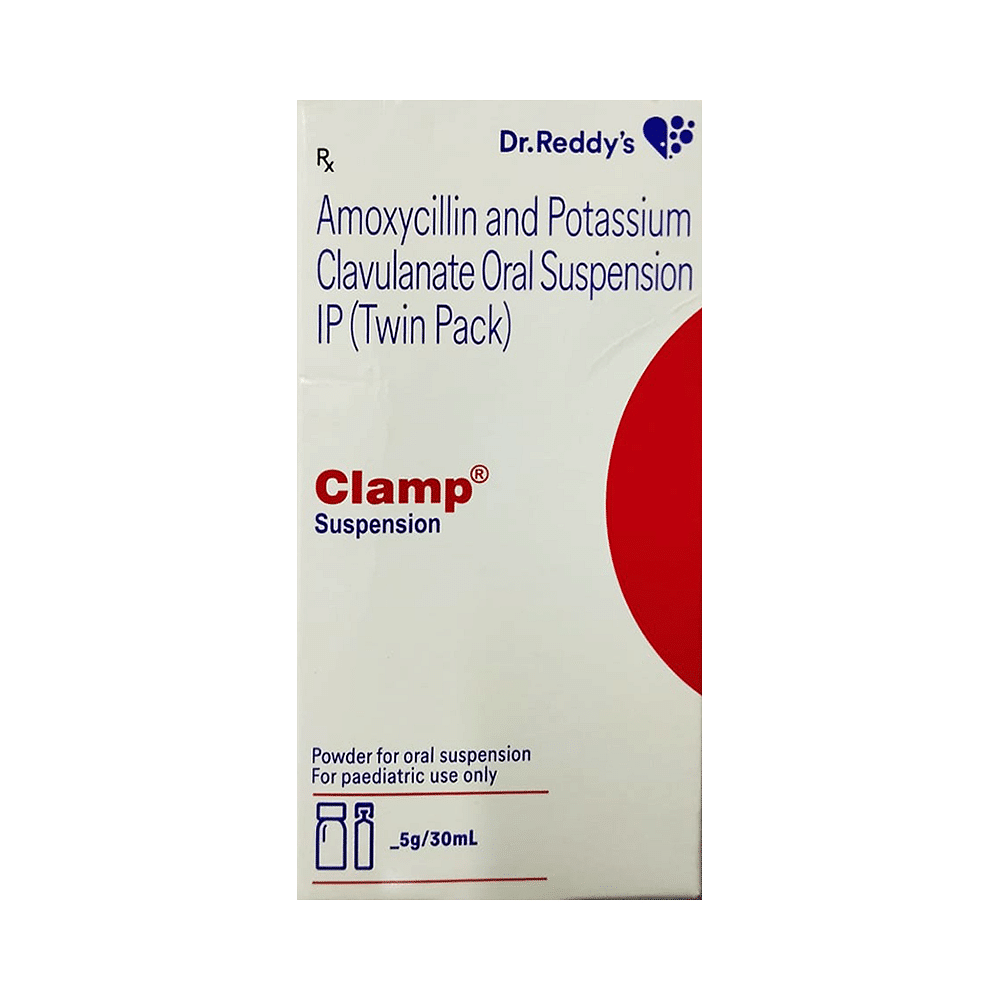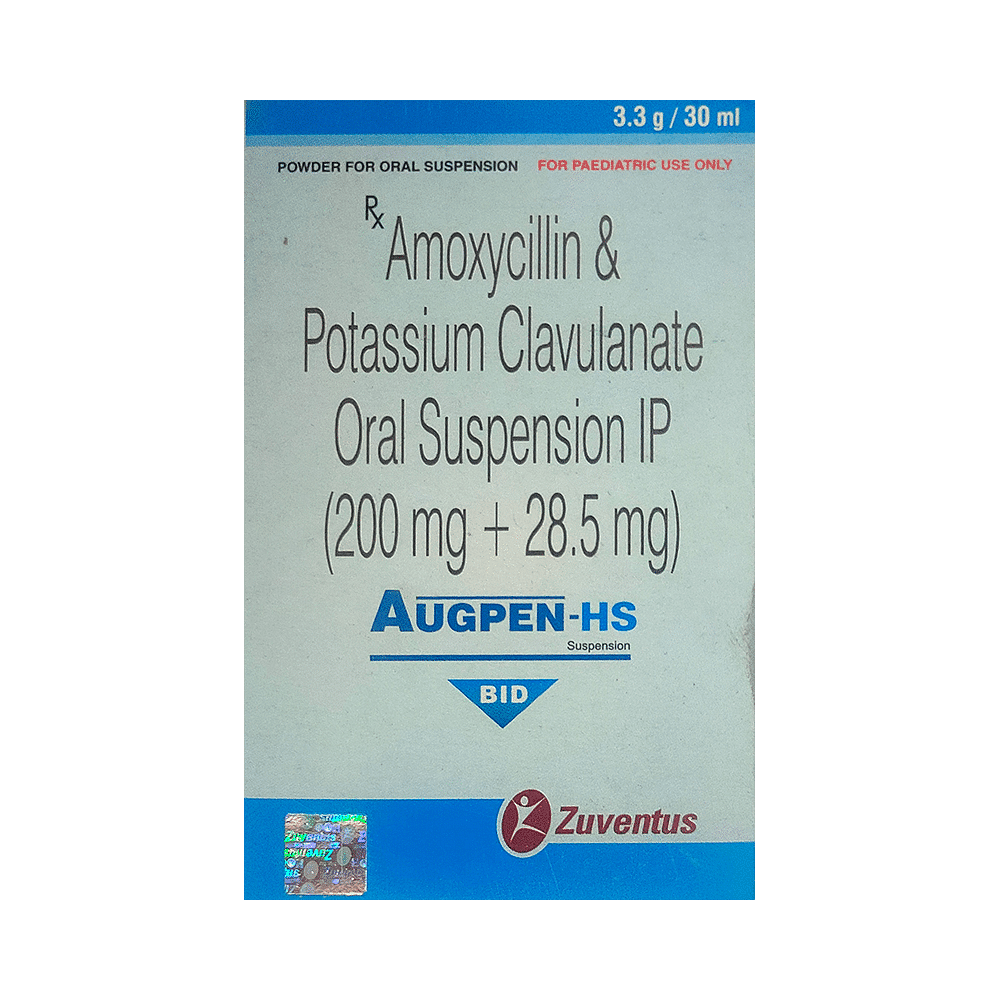
Claventin Suspension
Manufacturer
Asterism Pharmaceuticals Pvt Ltd
Salt Composition
Amoxycillin (200mg) + Clavulanic Acid (28.5mg)
Key Information
Short Description
Claventin Suspension is an antibiotic medicine that helps treat bacterial infections of the ear, nose, throat, chest, lungs, teeth, skin, and urinary tract.
Dosage Form
Suspension
Introduction
Claventin Suspension is an antibiotic medicine that helps treat bacterial infections of the ear, nose, throat, chest, lungs, teeth, skin, and urinary tract. It is capable of killing bacteria that have become resistant to other therapies and thus also helps treat tuberculosis that is resistant to other treatments.
Directions for Use
Your child must complete the entire course of antibiotics. Stopping too soon may cause the bacteria to multiply again or cause another infection.
How it works
Claventin Suspension is an antibiotic. It has two active agents amoxycillin and clavulanic acid. Amoxycillin works by preventing the formation of the bacterial protective covering (cell wall) essential for the survival of the bacteria. Whereas clavulanic acid serves a special purpose of inhibiting an enzyme (beta-lactamase) that is produced by resistant bacteria. This makes the combination of amoxycillin and clavulanic acid an effective line of treatment for many types of infections.
Quick Tips
Your child must complete the entire course of antibiotics. Stopping too soon may cause the bacteria to multiply again or cause another infection. Your child may have a bitter taste in the mouth after the intake of Claventin Suspension. Eating citrus fruit or sipping plenty of water or fruit juice may help. Encourage your child to drink plenty of water in case diarrhea develops as a side effect. Never give Claventin Suspension until and unless prescribed by the doctor. Do not give Claventin Suspension to treat common cold and flu-like symptoms caused by viruses. Never save medicine for future illnesses. Check ‘expiry’ before giving Claventin Suspension to your child. Immediately discard all the expired medicines. Stop Claventin Suspension immediately if your child develops an itchy rash, facial swelling, or breathing difficulty. Report to the doctor without any delay.
Related Medicines

Clamp Suspension

Ampoxin-CV 200mg/28.5mg Suspension

Barclav PD 200mg/28.5mg Suspension

Everclav Suspension

Amoxytop CV 200mg/28.5mg Suspension

Moxid Duo Suspension

AC Duo DS Suspension

Augpen HS 200 mg/28.5 mg Suspension

Mcv DS Suspension

Actis HS 200 mg/28.5 mg Suspension
Frequently asked questions
Can other medicines be given at the same time as Claventin Suspension?
Claventin Suspension may interact with other medications or substances. Before starting Claventin Suspension, inform your child's doctor about all medications they are currently taking. Always consult a healthcare professional before giving any medication to your child.
Can I get my child vaccinated while on treatment with Claventin Suspension?
Antibiotics generally do not interfere with the ingredients in vaccines or cause adverse reactions in children after vaccination. However, it is advisable to postpone vaccinations until the illness has been resolved and your child fully recovers. Once the child feels better, the vaccine can be administered.
Which lab tests may my child undergo while taking Claventin Suspension on a long-term basis?
Periodically, with prolonged therapy, a doctor might monitor kidney and liver function tests to assess your child's overall condition.
Can I give a higher than the recommended dose of Claventin Suspension to my child?
Giving a dosage above the recommended amount for Claventin Suspension can increase risks associated with side effects. If your child experiences worsening symptoms, consult your doctor for reassessment.
Can I stop giving Claventin Suspension to my child when the symptoms are relieved?
It's important not to discontinue Claventin Suspension without consulting your child’s doctor. While symptoms may improve before complete infection eradication, continuing the full course of medication may be beneficial.
Can the use of Claventin Suspension cause diarrhea?
Yes, Claventin Suspension can sometimes cause diarrhea. This is because it's an antibiotic that kills harmful bacteria in the body. Moreover, it may also affect the beneficial bacteria in your child’s gut and result in diarrhea. If your child experiences diarrhea, encourage them to drink plenty of fluids and consider contacting a doctor if the symptoms persist or signs of dehydration (decreased urination with dark-colored and strong-smelling urine) appear.
Do all viral common colds result in secondary bacterial infection?
Most viral infections do not lead to secondary bacterial infections. In fact, giving antibiotics during a viral infection can increase the risk of side effects. Therefore, antibiotics should only be used after consulting with your child's doctor.
The mucus coming out of my child’s nose is yellow-green. Is it a sign of a bacterial infection?
Yellow or green mucus in the nose does not automatically indicate a bacterial infection, especially during a common cold. It is normal for mucus to thicken and change color from clear to yellow or green during this time. Symptoms typically last 7-10 days.
Is there any sign which shows that my child needs immediate medical attention?
If your child experiences serious allergic reactions (difficulty breathing, skin rashes), gastrointestinal complications (diarrhea), or liver damage (weakness, paleness, vomiting), immediately contact a doctor. Although rare, these side effects are serious and require immediate expert intervention.


